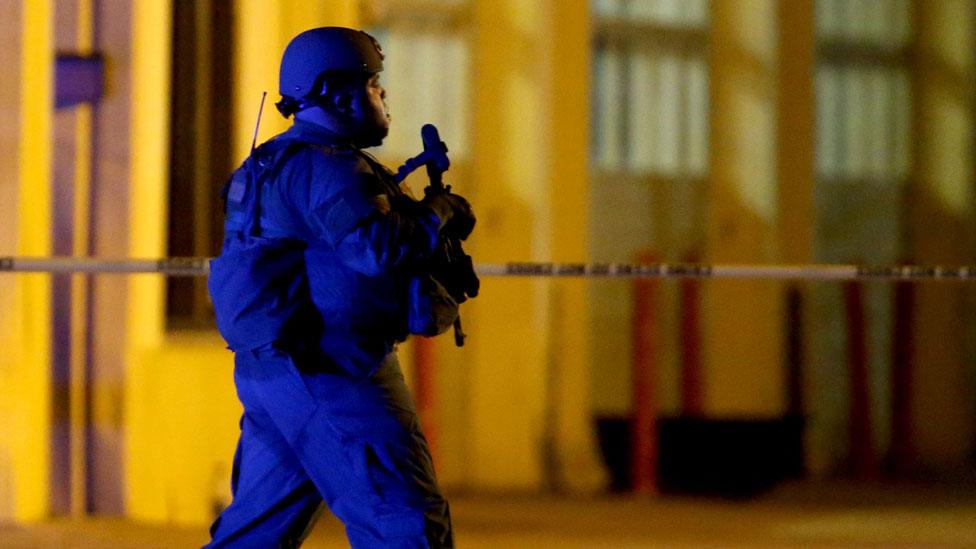Are US police too quick to shoot knife-wielding suspects?
- Published
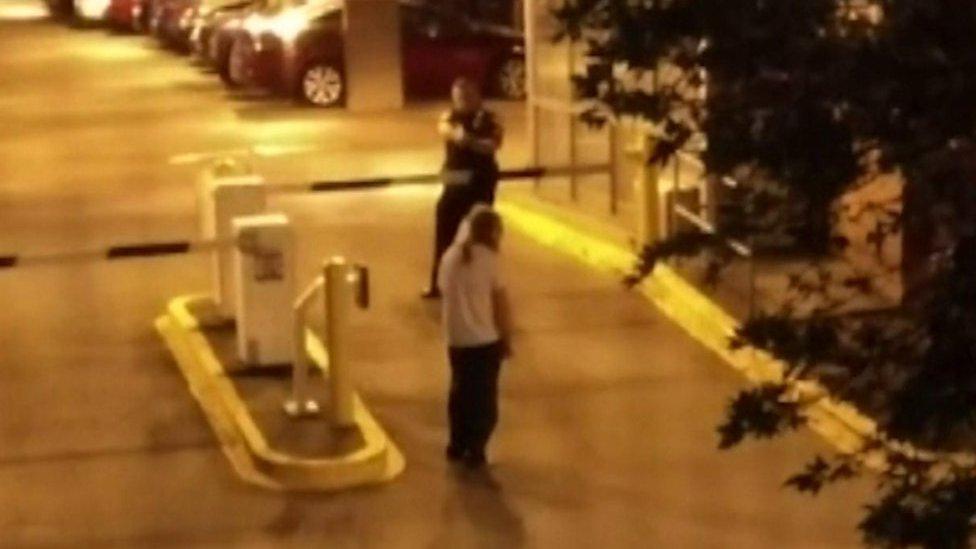
A police officer aims his gun at Scout Schultz, moments before the student died
The shooting of a student at Georgia Tech has raised questions over when and why police resort to deadly force. In some cities, including one of America's poorest and most violent, officers are trying a different approach.


On 17 November 2015, Sergeant Mickey White was driving home in his patrol car, his shift over, when a call went out about a man harassing customers at Jerry's Country Meat and Catering, a local grocery store in Arlington, Georgia.
The employee who dialled 911 said the man was behaving oddly, accosting people and singing a hymn - "Great is Thy Faithfulness" - as he walked up and down the aisles.
Sgt White took the call. When he arrived, the man was outside sitting in his car, the door open and hazard lights on. He was Derry Eugene Touchtone, a 58-year old white man from Headland, just over the state border in Alabama. He was unarmed.
As Sgt White pulled up behind Touchtone, the dashboard camera in his patrol car was recording.
In the video, the officer can be heard telling Touchtone to leave the vehicle. Touchtone complies but then ignores repeated instructions to put his hands on the car. Instead he walks slowly out of shot, towards White, and begins to sing.
Sgt White fires his Taser but it fails to stop Touchtone. Off camera, a tussle can be heard, followed by two gunshots.
Thirty-five seconds after Sgt White had arrived, Touchtone was dead.
The dashcam kept recording as other officers arrived on the scene, and it overheard Sgt White talking to another deputy.
"You know the bad thing about it, Brent?" White says, "I could've fought him."
"Don't second guess yourself," Brent replies. "You did what Mickey had to do."
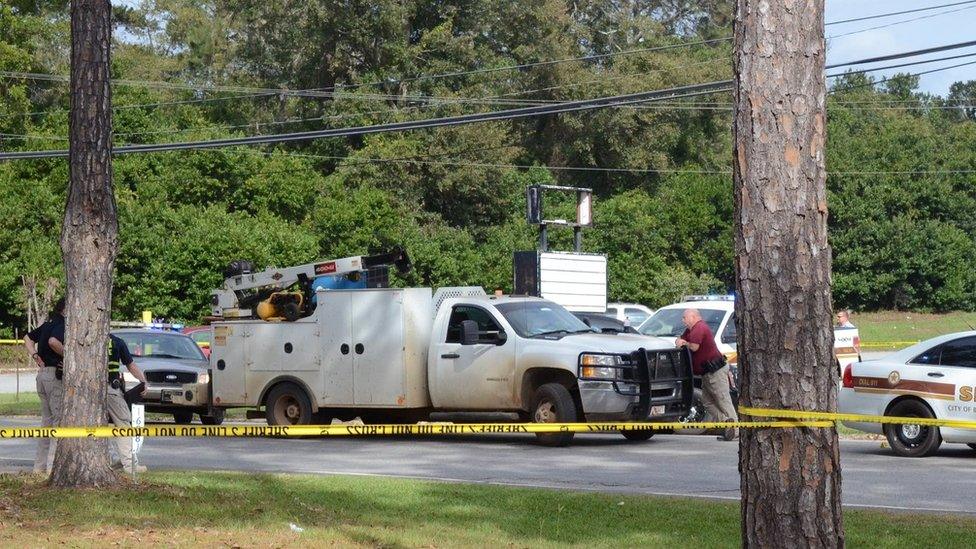
Sergeant Mickey White pictured after the shooting
Two years later, and 200 miles north, another controversial police shooting in Georgia has raised questions over exactly what officers have to do to protect themselves against suspects who threaten them with fists, knives, bats or other non-firearm weapons.
Scout Schultz, a 21-year-old Georgia Tech student who had battled depression, was reported to police on Sunday after being seen on campus with a knife.
When officers arrived on scene, Schultz approached them holding the knife - in reality a multi-tool with a small blade, which a family lawyer says was closed.
In an amateur video of the incident, Schultz can be heard saying "Shoot me!" while walking towards the officers.
"Drop the knife, man, come on," a police officer responds.
"Nobody wants to hurt you," another officer says.
The final moments before Scout Schultz was shot
Schultz ignores repeated requests to drop the knife, then takes a few steps towards one of the officers. The officer opens fire, hitting Schultz in the chest. The student was transported to the Grady Memorial Hospital but died from the gunshot wound.
At a press conference, Schultz's father was asked what he would like to say to the officer who pulled the trigger.
"Why did you have to shoot?" Bill Schultz said. "That's the question, I mean that's the only question that matters right now. Why did you kill my son?"
It's question that goes to the heart of a shift in policing tactics that is taking place in some parts of the country - an attempted move away from the use of deadly force and towards de-escalation.
A series of highly publicised police shootings have drawn national attention to so-called officer-involved shootings, but the vast majority of police officers in the US still have little or no training in how to recognise and engage with a suspect suffering from a mental health crisis, or de-escalate a threat from a knife without resorting to a gun.
'Slow it down'
On 9 November 2015, about a week before Sgt Mickey White pulled up at Jerry's Country Meat, a 48-year-old man walked into a Crown Fried Chicken in Camden City, New Jersey, and pulled out a steak knife. High on PCP, and with a history of mental health problems, he was acting wildly, threatening customers.
Outside, he jabbed the knife in the direction of two police deputies before setting off down the street. He was soon surrounded by a dozen or so officers, but he continued to swing the knife and move forward.
At this point, the situation could so easily have played out the way it did at Georgia Tech on Sunday. The officers could have stood their ground, as they had the right to do. They could have followed a decades-old policing rule that anyone with a knife within 21ft presents an immediate threat to life. They could have shot him dead.
But in Camden, one of the poorest and most violent cities in the country, police have for the past few years been taking a new approach. "We stress to our officers that you do not have to rush in and rapidly resolve every scenario," said Lieutenant Kevin Lutz, who has overseen the shift in tactics.
"It's OK to slow down, it's OK to take a step back. Sometimes the best thing is to holster your weapon and talk."
The Camden officers following the knife-wielding suspect slowed down. They formed a loose group around the man, clearing the street ahead and walking alongside him. One spoke to him, periodically asking him to drop the knife. They waited. Most of the officers had their guns holstered, a few held them subtly at their sides.
About 45 minutes after police arrived they were able to Taser the man, and he was arrested.
Police in Camden City, NJ, resorted to patience instead of guns
"Those officers would 100% have been legally justified to use deadly force," said Lt Lutz. "Had they stood their ground a deadly encounter would have been forced at that point. By allowing it to unfold, it ended with an arrest and the suspect is alive. Five or 10 years ago, he wouldn't be."
But the Georgia Tech shooting on Sunday shows that similar incidents still end fatally today. Of the 40,000 or so serving police officers in the state, about 10,000 have received some kind of mental health and de-escalation training over the past decade, according to the Georgia Bureau of Investigation. The gold standard is a 40-hour course run in conjunction with the National Alliance for Mental Illness, but the majority of those 10,000 officers - and the vast majority of police officers across the country - will have received significantly less than that.
And a proportion of those 10,000 officers have retired or moved on to desk jobs, leaving no clear picture of how many current frontline officers in Georgia have had some form of de-escalation training. It is not known whether the officers that confronted Scout Schultz had had any.
According to a 2015 national survey by the Police Executive Research Forum (Perf), police officers received on average 58 hours of firearms training, 49 hours on defensive tactics, and just eight hours on mental health and de-escalation. There are no states which mandate de-escalation training.
Lessons from the UK
Camden police worked closely with Perf in developing its new approach. Perf in turn took inspiration from officers in Scotland. In late 2014 - shortly after the police shooting of Michael Brown sparked violent unrest in Ferguson, Missouri - Perf director Chuck Wexler was in Scotland for a leadership training programme.
Looking around him at a graduation ceremony, Mr Wexler was struck by the fact that none of the officers were carrying guns.
"What hit me was the fact that these officers deal with similar knife situations that we deal with," he said. "A knife in Glasgow is the same as a knife in downtown Washington DC, so why are they able to do it without shooting?"
Mr Wexler returned to the US armed with the UK's National Decision Model - a framework that emphasises communication, patience, and minimal force. He took note of interesting tactics, like a police officer removing his hat to appear more open and less confrontational. Perf now works with police departments across the country to train officers in looking for alternatives to firing their gun.
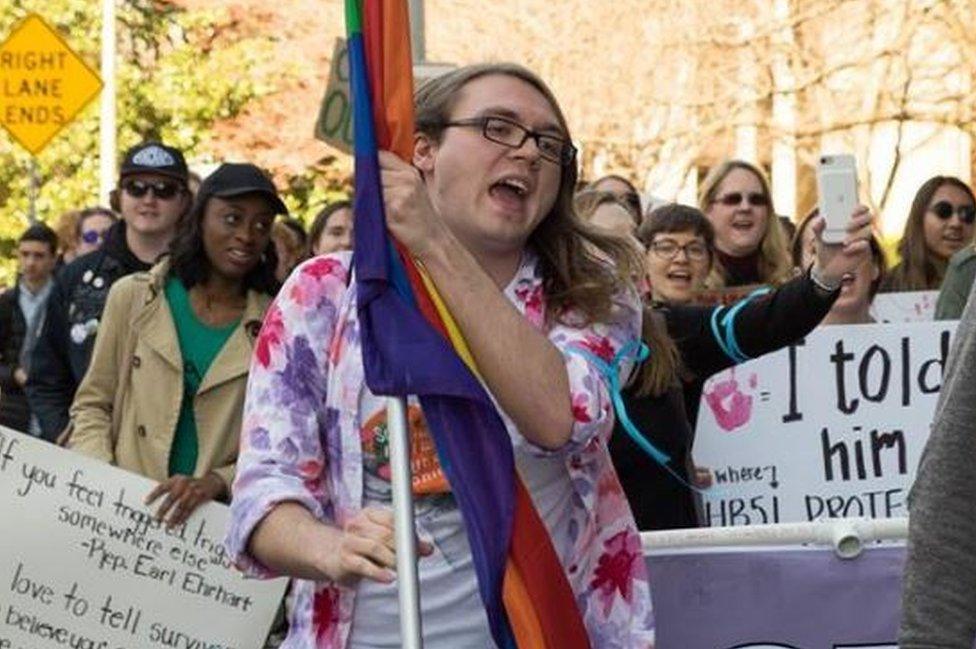
Scout Schultz at an LGBT pride march
Those alternatives can present themselves in any number of small decisions before a final, momentous one, said Greg Ridgeway, a statistician at the University of Pennsylvania who has studied police shootings.
"Often you look at the three seconds before the shooting and it looks like a good shoot," he said. "Suspect comes at officer with knife, officer shoots. Fine. But step back five minutes, even a minute, and you start questioning how the officer got themselves into that situation where they had no option but to shoot. And you see that a little bit of patience, a little bit of distance, could have resolved some of those incidents peacefully."
The Georgia Bureau of Investigation (GBI) declined to comment on the incident at Georgia Tech, but the video suggests that crisis intervention tactics - and the kind of patience exhibited by the officers in Camden County - might have resolved that incident peacefully.
GBI director Vernon Keenan acknowledged that the amount of mental health and de-escalation training currently given to most officers was "minimal". He said the state was in the process of reviewing the amount of training on offer and recruiting 12 new permanent staff to oversee more.
Even those who bang the drum loudest for a rethink over the use of deadly force acknowledge that it is still sometimes the only option, and the 300 million or so guns in America put it in a vastly different position to countries like Scotland. "Make no mistake, there are times when force is going to be immediate and required," said Lt Lutz.
But in places like Camden, they are trying to shift the emphasis. Officers are taught to put an "absolute value on the life of the person they encounter, regardless of what behaviour they are exhibiting at the time," said Lt Lutz.
"If our officers value life, and they are morally sound, and they are responding to the call and thinking through why they are there, then we believe some of the more controversial shootings that have taken place across the country, right or wrong, can be avoided."
Read more
- Published18 September 2017
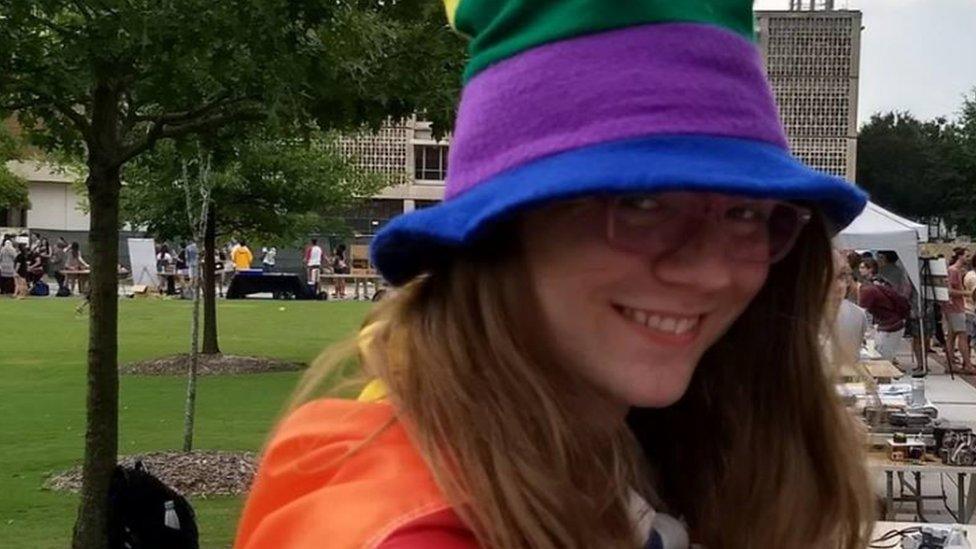
- Published11 July 2017
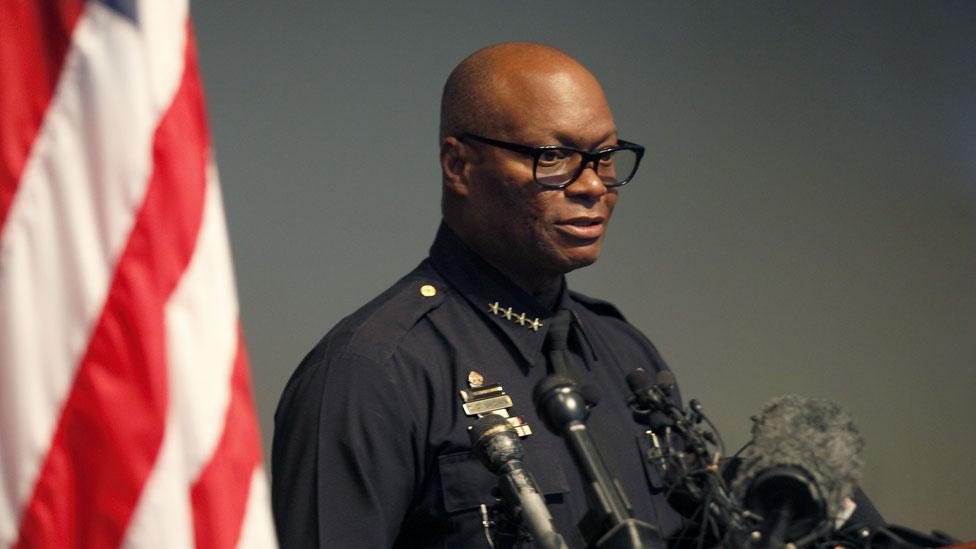
- Published18 July 2016
